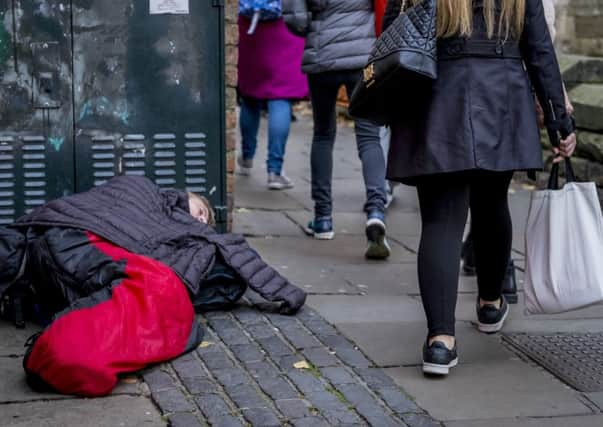Bassetlaw council defends homelessness record amid rise in drug deaths


Homelessness charity Crisis claims that the scale of the reported situation across England and Wales shows authorities are failing to get to grips with the issue.
Across England and Wales, 726 homeless people died in 2018 – up 22 per cent from the previous year, and 51 per cent more than in 2013.
Advertisement
Advertisement
This was the biggest annual rise in homeless deaths since records began, driven by a huge increase in drug-related fatalities.
An estimated 294 drug-related deaths occurred last year, compared to 190 in 2017, with opiates such as heroin or morphine the most commonly cited on death certificates.
Crisis chief executive Jon Sparkes said: “It is heart-breaking that hundreds of people were forced to spend the last days of their lives without the dignity of a secure home.
“This is now the second year running where we have known the true scale of the human cost of homelessness, yet still the lessons from these tragic deaths go unlearned.”
Advertisement
Advertisement
He added: “It’s crucial that the Government urgently expand the safeguarding system used to investigate the deaths of vulnerable adults to include everyone who has died while street homeless, so we can help prevent more people from dying needlessly.
“Because in this day and age, there is no excuse for anyone dying without a safe place to call home.”
However, Councillor Steve Scotthorne, Bassetlaw’s cabinet member for housing, feels the criticism of the national picture does not match the council’s own record.
He said: “The death of anyone under these circumstances is tragic and regrettable and in Bassetlaw we have put measures in place to try and tackle the root causes of drug related deaths among rough sleepers.
Advertisement
Advertisement
“Within Bassetlaw there has never been greater access to services or accommodation for rough sleepers, especially those who are experiencing issues with substance abuse, be that drugs or alcohol, and we would challenge the statement made by Crisis and say that lessons have been learnt.”
He went on to highlight recent initiatives such as the council’s work with the Change, Grow, Live charity, and the recruitment of a dedicated outreach worker as part of Project Steppingstones.
Coun Scotthorne said: “This programme has already helped to get more than 40 people off the streets in Bassetlaw and into rehab, specialist supported accommodation or find their own housing.
“Rough sleeping is a complex and fluid issue and our latest figures suggest that there are at least four individuals in Bassetlaw who are still long-term rough sleeping. Unfortunately, some of these individuals are not yet willing to change their lifestyle or accept the help that is on offer.”
Advertisement
Advertisement
He added: “In addition to our responsibilities through the Homeless Reduction Act, we will continue to work with our partners, including housing associations, homeless shelters and charities to try and help people in our district who are sleeping rough to change their lifestyles and find them the most appropriate accommodation.”
The Government claims to be investing £1.2billion to address homelessness, but the Labour Party and other organisations involved in tackling the issue have said much more needs to be done.
A Government spokesman said: “Every single death on our streets is one too many and these statistics are a sombre reminder that there is still much more to do to tackle homelessness and end rough sleeping for good.
“Drugs can devastate lives, ruin families and damage communities, which is why we are undertaking a comprehensive review which will help protect the most vulnerable – including homeless individuals – from the harms that drugs cause and give them a chance to recover and turn their lives around.”